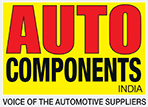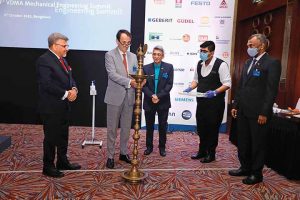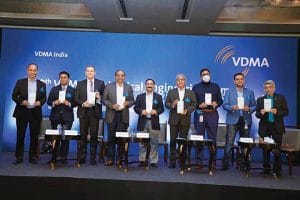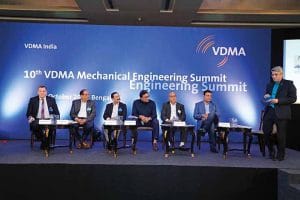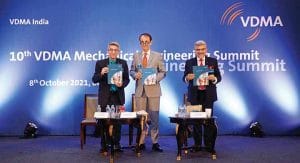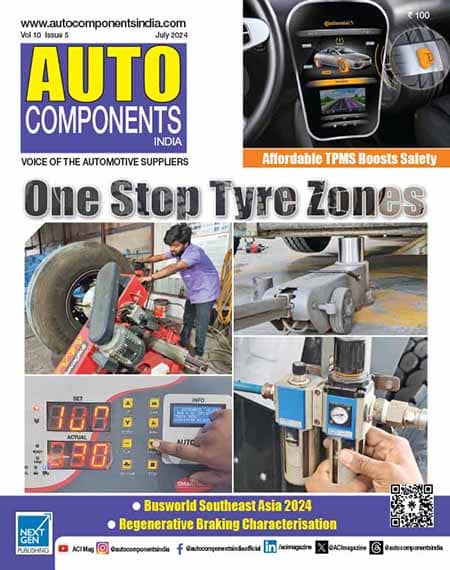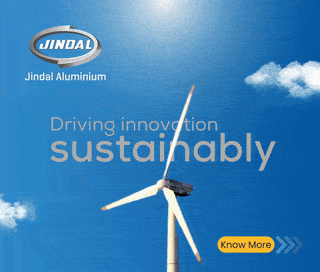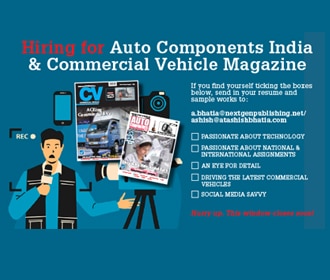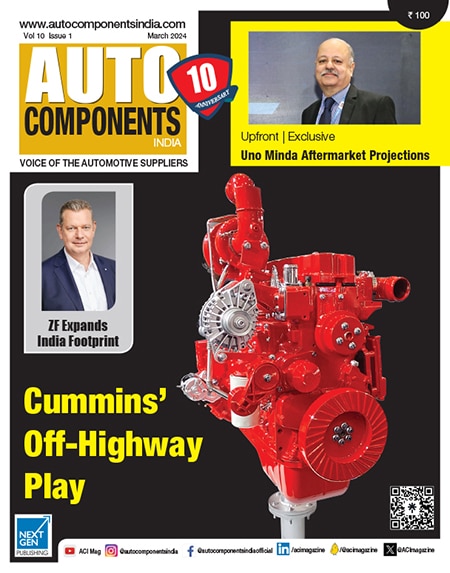The VDMA Mechanical Engineering Summit marked a decade of existence with industry experts looking back at unprecedented challenges and discussing green shoots. Deepti Thore and Sumesh Soman report on the key findings.
Held on October 08, 2021, the 10th VDMA Mechanical Engineering Summit witnessed participation from over 250 delegates from across 17 cities pan India. Hosted in Bengaluru, the annual flagship event of VDMA India had mechanical engineering in the limelight. Taking a backseat with the advent of electrical and electronics engineering finding many takers as the world transitions to e-mobility, mechanical engineering is still worshipped by the purists in the automotive industry. On the agenda were burning issues like the Indo-German relations and the need for business synergies and government support; Transformation of manufacturing in India; Increasing protectionism in the US-China-EU triangle; Investment opportunities and new initiatives to enhance the development of manufacturing in Karnataka, and Emerging opportunities with Atmanirbhar Bharat and Production Linked Incentive (PLI) scheme. The summit also touched upon government incentives and subsidies, ease of doing business in the state of Tamil Nadu, digitalised future for the industrial ecosystem, and digital transformation on the shop floor.
Emerging stronger after a tough fiscal
Setting the tone of the day, Rajesh Nath, Managing Director, VDMA India expressed a sense of relief with the tough fiscal on the cusp of fading out. Averred Nath, “India is sustaining a V-shaped recovery after the first wave and the combined index of eight core industries stood at 133.5 in August 2021, an increase of 11.6 per cent as compared to August 2020.” He drew attention to India’s progress from an economy of scarcity in 1991 to an economy of sufficiency in 2021. “India has to transform itself into an economy of sustainable abundance and equitable prosperity by 2051,” he stated. Kamal Bali, President And Managing Director at the Volvo Group, India marked his first public appearance in 550 days, by lauding the Micro Small and Medium Enterprises (MSME) and the manufacturing sector as a whole for seeing through the tough fiscal with immense resilience.
Crediting the sector for its crucial role in giving India its best chance yet to turn into a five trillion dollar economy, he called upon the stakeholders to take full advantage of government intervention in the form of PLI. He also urged for greater compliance to the Goods and Services Tax (GST) in place from 2017 besides other initiatives to offer an ease of doing business in the country. Atish Laddha, Senior Associate, Indirect Taxation, Roedl & Partner India Pvt. Ltd. speaking on the government incentives and subsidies elaborated on the GST return incentives, the state industrial policy, the customer bonded warehouse policies, and the Export Promotion Capital Goods Scheme (EPCG Scheme) deemed beneficial to the manufacturers. As per the ‘World Development Indicators’, it takes 88 days to get the requisite clearances to start a business in India, whereas it takes 46 days in China, eight days in Singapore and four days in the USA. A special summit issue was released at this stage.
Protectionism or open trade
With growing protectionism reflecting in trade, the need to remove trade barriers found a calling at the summit. Ulrich Ackermann, Managing Director, Foreign Trade Division, VDMA Frankfurt drew attention to the changes in the global economy and cited the VDMA stand supporting an economy where trade is conducted without barriers. At this juncture, the state of Karnataka was positioned to investors as a state synonymous with holistic opportunities and ripe for investments. BDB India released a specially compiled paper on the subject of government incentives for the emerging opportunities in discussion at the conclave. The benefits of the PLI scheme were also emphasised upon.
Aditya Nagarajan, Vice-President, Investment Promotion, Guidance Tamil Nadu, Industries Department, Government of Tamil Nadu, speaking on the subject of ease of doing business in the state of Tamil Nadu, highlighted the state’s relation with Germany about the manufacturing sector. Nagarajan provided inputs on the future investment opportunities with Tamil Nadu for the German organisations and its potential as an export hub and strategic port geography. He highlighted the robust ecosystem, general engineering situation and the top five district clusters in the state besides highlighting the initiative ‘BizBuddy’. The latter is a state governed, a centralised online portal for promoting ease of paperwork. The session on ‘Digitised future of the Industrial Ecosystem- It’s in your Hands’ presented by Umesh Pai, Managing Director, EPLAN Software & Services Pvt. Ltd. highlighted the tectonic shift over the last 15 years led by operational management, Industry 4.0, and Industrial Internet of Things (IIoT). He deemed it a crucial link aiding in product design and product engineering in the product life cycle design and development.
Future Trends in Smart Manufacturing
The session on ‘Future Trends in Smart Manufacturing’ saw experts from companies like Robert Bosch, SAP and SIEMENS deliberating on the future of manufacturing. Sreekanta Aradhya, Global head – Connected Industries Business Area, Robert Bosch Engineering & Business Solutions spoke about ‘Seize the I4.0 Opportunity – Onboard the Digital Transformation Journey’ where she explained the process of digitalisation from the ‘Bosch perspective’ along with providing a comprehensive guide map for companies commencing their transformative journeys. It included building the foundation blocks, visualising the data, improving business insights and creating new business models. This was followed by a presentation on ‘Autonomous Factories – Reality or Myth’ where Prashanth Uppunda, Technology & Innovation Topics Leader, Siemens Technology & Services Pvt. Ltd. highlighted the criticality of striving towards ‘Lot Size One’. He introduced Seimen’s start-up project on Flexible Grasping. The session on ‘Digital transformation on the shop floor highlighted the various scenarios where SAP is claimed to have helped companies turn their shop floors around by facilitating digital-driven factories. Sumantha Chakraborty, Senior Project Manager, SAP India presented various use cases and real-life scenarios of digital transformation on the shop floor.
Economic reforms
Make in India 2.0 and Atmanirbhar Bharat policies were looked at from the perspective of adding to efficiencies, competitiveness and resilience. Looked upon as contributors of self-sustaining and self-generating interventions, the role of PLI came under scrutiny too. PLI said Prashanth Doreswamy, Country Head & Managing Director, Continental Automotive Components India Pvt. Ltd. said, “The scheme has fast-tracked investments with almost Rs.3.5 lakh crores allotted in which Rs.56,000 crores is dedicated to the automotive sector.” “With countries becoming more nationalistic, acquiring parts is becoming tougher”, he admitted. According to Doreswamy, the scheme will help India look inwards and keep at par with other global competitors. V G Sakthi Kumar, Managing Director, Schwing Stetter India Pvt. Ltd. stressed on the need for a strong infrastructural push for India to attain its target of turning into a five trillion dollar economy. Transportation is a key focus area, he cited. On skilling and reskilling, the German dual education program was cited as a global best practice for India to adopt. Vocational training was given its due at the summit. The summit also witnessed the ‘4th Manufacturing Excellence Awards’ where Continental Automotive Components Pvt. Ltd, Daimler India Commercial Vehicles, Kern-Liebers India Pvt. Ltd and Robert Bosch Ltd. were among the winners. ACI
